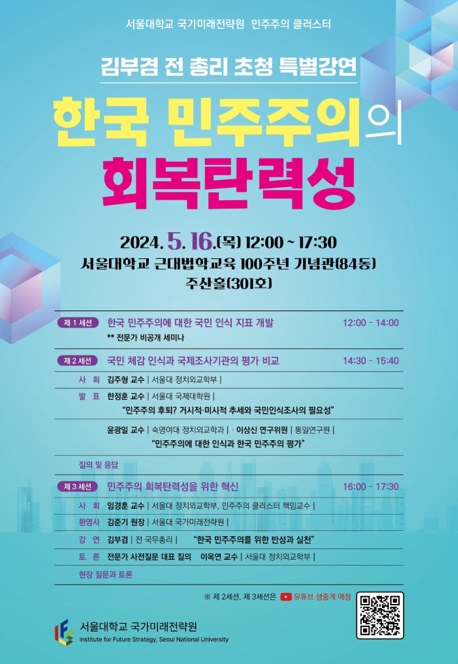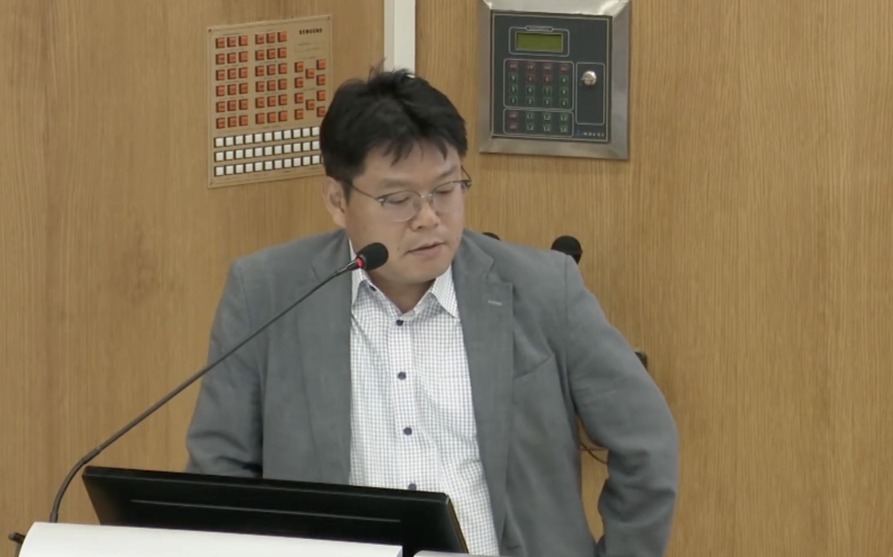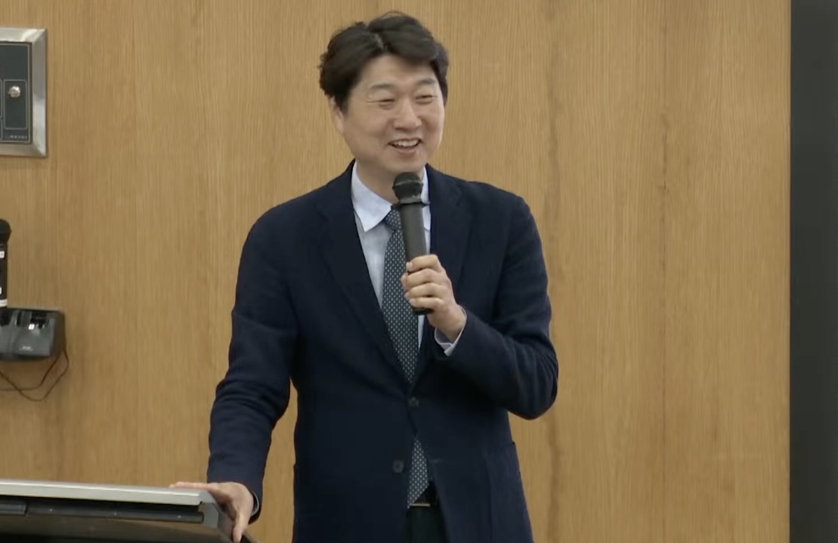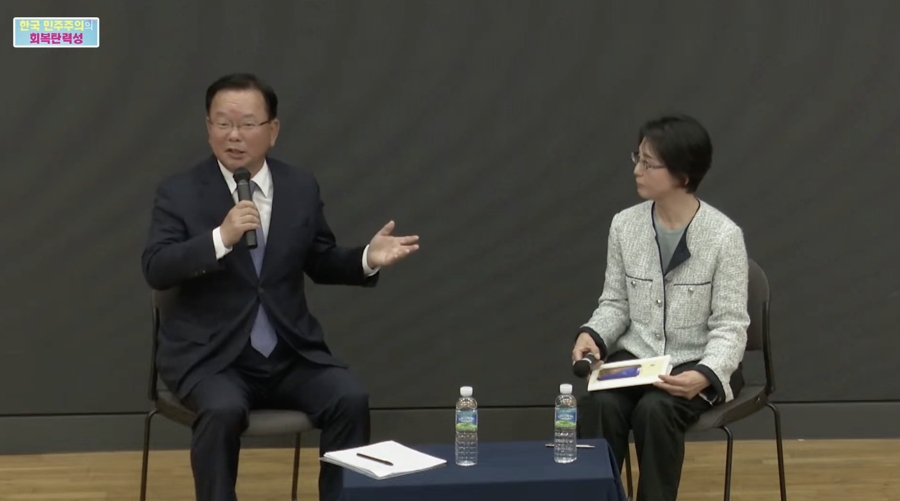At the core of any thriving nation is the sustenance of a healthy democracy. On May 16, the Democracy Cluster of Seoul National University’s Institute for Future Strategy (IFS) hosted a symposium titled “The Resilience of Korean Democracy.” The event provided a platform for many experts to convene and present their research findings on the present status of Korean democracy, conjectures on its current trajectory, and future action that must be taken for it to further flourish.

“The Resilience of Korean Democracy”
The Ongoing Deficiencies in Korean Democracy
Despite a global trend of increase in democratization, the instability of existing democracies has also risen over time. Accordingly, the precarious state of these democracies has garnered tremendous interest from researchers.
Korean democracy is not an exception to such volatility; the country has oscillated between high and low ratings at different points in time. Moreover, what is glaringly obvious across all indices—the Varieties of Democracy (V-Dem) Indices, Democracy Index, and Global State of Democracy (GSoD) Indices—is that the country’s ranking has taken a downturn. For instance, the V-Dem Indices indicate that out of the nearly 200 countries ranked, South Korea has seen a drop from 34th in 2018 to 47th in 2023.
Further dissection of data reveals that South Korea chronically underperforms in freedom of political expression, freedom of association, political equality, and gender equality. What is arguably more troubling, however, is that the country is now struggling in areas it has performed well in in the past. Some examples of these include freedom of the press, participation in public service, and the vitality of civic engagement. It seems that instead of making strides forward, we are now teetering backward.
Nonetheless, what is still unclear is where South Korea actually is in terms of its democracy. As of now, all democracy indices utilize their own evaluation criteria; consequently, each country is given a myriad of differing rankings. It is demonstrated time and time again that there is a dire need for a more comprehensive composite index. To establish one, Professor Han JeongHun (Graduate School of International Studies), one of the day’s lecturers, highlighted the necessity of thoroughly consulting countless experts to form an all-encompassing definition of what constitutes democracy.

Professor Han JeongHun on What is Revealed by Democracy Indices
Korean Citizens’ Perception of Democracy
An area that has so far received insufficient attention is the layman’s understanding of Korean democracy. Though individual researchers have shown interest in digging deeper, no systematic evaluation has ever been conducted. Therefore, no data exists detailing the progression in people’s perspectives of democracy and Korea’s democratic practices over time. How does Korean citizens’ understanding converge or contrast with the viewpoints of experts in the field? Why and from where may these discrepancies arise? These are all valuable questions that deserve an answer.
Dr. Lee Sangsin, a research fellow and the director of the Center for the Study of Liberal Democracy at the Korea Institute for National Unification (KINU) presented some of his findings in response to these recurring questions. It turns out that there is an astonishing number of South Koreans—many hidden in plain sight—who do not agree with the core values of democracy and a strong democratic nation as the end goal. Survey results of South Korean citizens, obtained through questions guided by the Right-Wing Authoritarianism (RWA) scale, evidence this fact. A staggering 53.1% of the survey respondents believe that “to preserve our values and maintain law and order, amid a recent rise in sexual corruption and social chaos, the country must take on a stronger approach against problem groups.” Another 52.3% believe that “South Korea requires a strong leader who can fight back against and decimate all extremists that are ruining the country,” and 43.3% are adamant that “what South Korea needs is not more human rights but a stronger legal order.” It seems that the “democracy” that many understand and desire is closer to soft authoritarianism or illiberal democracy. Therefore, Lee stated that it is not enough to survey people on their beliefs about democracy. To obtain accurate and comprehensive data on citizens’ perceptions, it is also crucial to learn about their overall belief system and the reasoning behind their core values.

Dr. Lee Sangsin on South Koreans’ Perceptions of Democracy
Special Insights by Former Prime Minister Kim Bu Gyeom
The symposium concluded with a special lecture by former prime minister Kim Bu Gyeom, reflecting on the sociopolitical state of South Korea today. Kim asserted that populism has found its way to the heart of Korean society and politics, citing ever-increasing economic disparities and the advent of the digital age as factors that feed into its burgeoning. Politicians across all parties have relied upon incessant finger-pointing at the other, instead of tackling the root of today’s societal issues.
Kim also highlighted the importance of recognizing the signals of a democracy in crisis. The symptoms are the following: 1) established political parties and politicians colluding with populists, 2) the ruling party stigmatizing its rivals as anti-state forces, 3) the opposition party raising conspiracy theories and refusing to accept its defeat, 4) the president continuously bypassing the National Assembly and issuing an excess of executive orders, and 5) the National Assembly attempting to undermine the executive branch.

Kim Bu Gyeom on His Insights into Korean Democracy
In order to mold Korean democracy into one that is healthier and more sustainable, there is still much work to be done. Bringing about real and meaningful change is never easy. Nonetheless, we all have an unwritten social obligation to stay informed, and when possible, actively participate in the affairs of our current society. To forge a better tomorrow, be the advocates of change today.
Written by Hee Seo Lee, SNU English Editor, heeseolee@snu.ac.kr

